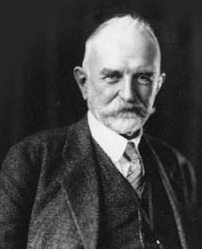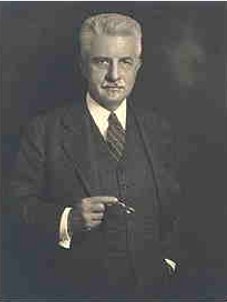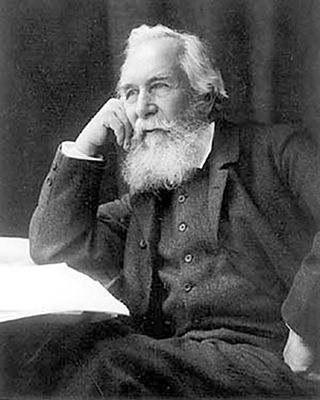
Charles Sanders Peirce was an American philosopher, logician, mathematician and scientist who is sometimes known as "the father of pragmatism".

William James was an American philosopher, historian, and psychologist, and the first educator to offer a psychology course in the United States. James is considered to be a leading thinker of the late 19th century, one of the most influential philosophers of the United States, and the "Father of American psychology".

Pragmatism is a philosophical tradition that considers words and thought as tools and instruments for prediction, problem solving, and action, and rejects the idea that the function of thought is to describe, represent, or mirror reality. Pragmatists contend that most philosophical topics—such as the nature of knowledge, language, concepts, meaning, belief, and science—are all best viewed in terms of their practical uses and successes.

"Pragmaticism" is a term used by Charles Sanders Peirce for his pragmatic philosophy starting in 1905, in order to distance himself and it from pragmatism, the original name, which had been used in a manner he did not approve of in the "literary journals". Peirce in 1905 announced his coinage "pragmaticism", saying that it was "ugly enough to be safe from kidnappers". Today, outside of philosophy, "pragmatism" is often taken to refer to a compromise of aims or principles, even a ruthless search for mercenary advantage. Peirce gave other or more specific reasons for the distinction in a surviving draft letter that year and in later writings. Peirce's pragmatism, that is, pragmaticism, differed in Peirce's view from other pragmatisms by its commitments to the spirit of strict logic, the immutability of truth, the reality of infinity, and the difference between (1) actively willing to control thought, to doubt, to weigh reasons, and (2) willing not to exert the will, willing to believe. In his view his pragmatism is, strictly speaking, not itself a whole philosophy, but instead a general method for the clarification of ideas. He first publicly formulated his pragmatism as an aspect of scientific logic along with principles of statistics and modes of inference in his "Illustrations of the Logic of Science" series of articles in 1877-8.

George Herbert Mead was an American philosopher, sociologist, and psychologist, primarily affiliated with the University of Chicago, where he was one of several distinguished pragmatists. He is regarded as one of the founders of symbolic interactionism and of what has come to be referred to as the Chicago sociological tradition.

Arthur Oncken Lovejoy was an American philosopher and intellectual historian, who founded the discipline known as the history of ideas with his book The Great Chain of Being (1936), on the topic of that name, which is regarded as 'probably the single most influential work in the history of ideas in the United States during the last half century'. In 1940, he founded the Journal of the History of Ideas.

Robert Boyce Brandom is an American philosopher who teaches at the University of Pittsburgh. He works primarily in philosophy of language, philosophy of mind and philosophical logic, and his academic output manifests both systematic and historical interests in these topics. His work has presented "arguably the first fully systematic and technically rigorous attempt to explain the meaning of linguistic items in terms of their socially norm-governed use, thereby also giving a non-representationalist account of the intentionality of thought and the rationality of action as well."

Sidney Morgenbesser was a Jewish American philosopher and professor at Columbia University. He wrote little but is remembered by many for his philosophical witticisms.

This Charles Sanders Peirce bibliography consolidates numerous references to the writings of Charles Sanders Peirce, including letters, manuscripts, publications, and Nachlass. For an extensive chronological list of Peirce's works, see the Chronologische Übersicht on the Schriften (Writings) page for Charles Sanders Peirce.
Pragmatism is a philosophical movement.

The term "world riddle" or "world-riddle" has been associated, for over 100 years, with Friedrich Nietzsche and with the biologist-philosopher Ernst Haeckel, who, as a professor of zoology at the University of Jena, wrote the book Die Welträthsel in 1895–1899, in modern spelling Die Welträtsel, with the English version published under the title The Riddle of the Universe, 1901.
Richard Shusterman is an American pragmatist philosopher. Known for his contributions to philosophical aesthetics and the emerging field of somaesthetics, currently he is the Dorothy F. Schmidt Eminent Scholar in the Humanities and Professor of Philosophy at Florida Atlantic University.

The Metaphysical Club: A Story of Ideas in America 2001 book by Louis Menand, an American writer and legal scholar, which won the 2002 Pulitzer Prize for History. The book recounts the lives and intellectual work of the handful of thinkers primarily responsible for the philosophical concept of pragmatism, a principal feature of American philosophical achievement: William James, Oliver Wendell Holmes Jr., Charles Sanders Peirce, and John Dewey. Pragmatism proved to be very influential on modern thought, for example, in spurring movements in modern legal thought such as legal realism.

Daniel W. Bromley is an economist, the former Anderson-Bascom Professor of applied economics at the University of Wisconsin–Madison, and since 2009, Emeritus Professor. His research in institutional economics explains the foundations of property rights, natural resources and the environment; and economic development. He has been editor of the journal Land Economics since 1974.

Donald Allen Crosby is an American theologian who is Professor Emeritus of Philosophy at Colorado State University, since January 2000. Crosby's interests focus on metaphysics, American pragmatism, philosophy of nature, existentialism, and philosophy of religion. He is a member of the Highlands Institute of American Religious and Philosophical Thought (HAIRPT) and has been a leader in the discussions on Religious Naturalism.

American philosophy is the activity, corpus, and tradition of philosophers affiliated with the United States. The Internet Encyclopedia of Philosophy notes that while it lacks a "core of defining features, American Philosophy can nevertheless be seen as both reflecting and shaping collective American identity over the history of the nation". The philosophy of the Founding Fathers of the United States is largely seen as an extension of the European Enlightenment. A small number of philosophies are known as American in origin, namely pragmatism and transcendentalism, with their most prominent proponents being the philosophers William James and Ralph Waldo Emerson respectively.
Czesław Znamierowski (1888–1967) was a Polish philosopher, jurist and sociologist. He was Professor of Jurisprudence at the University of Poznań and chaired its Department of Legal Theory and Philosophy of Law. Znamierowski is noted in Polish law for his contributions to social sciences and jurisprudence, particularly the concept of legal system which is similar to H.L.A. Hart's ideas, but was published almost forty years before Hart's The Concept of Law.
Huw Price is an Australian philosopher, formerly the Bertrand Russell Professor in the Faculty of Philosophy, Cambridge, and a Fellow of Trinity College, Cambridge.
Thelma Zeno Lavine (1915–2011), was an American philosopher, professor, and writer, specializing mainly in the areas of 19th and 20th century, especially the writing of John Dewey. She taught courses that highlighted the correlation between philosophy and other topics such as economics, history, and contemporary American culture
Jakov Alexandrovich Berman was a Russian philosopher and political theorist linked to Russian Machism and pragmatism.













